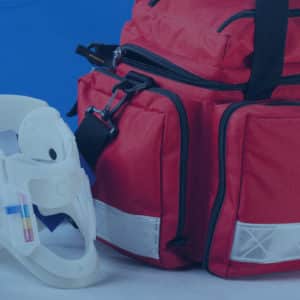Posted by: CTC Training
If you’re looking for a career that’s both challenging and rewarding, becoming an Emergency First Responder (EFR) might be the perfect job for you. Emergency First Responders are trained to respond to emergency situations and provide immediate medical assistance to those who are injured or ill.
As an EFR, your actions can significantly reduce the severity of injuries, and even save lives.
In this article, we discuss the Emergency First Responder role, including responsibilities, salary and the qualifications you can earn to get you into the role.

What are the responsibilities of an Emergency First Responder?
The responsibilities of an EFR can vary depending on the situation and the environment in which they are working. Typically, responsibilities will include:
- Assessing and treating patients
- Stabilising patients
- Providing first aid
- Arranging transport to a hospital or other medical facility
What is the salary of an Emergency First Responder?
The average EFR in the UK can earn around £24,000 – £35,000 per year, depending on their level of experience and qualifications. Often, it’s the personal satisfaction that comes with being an EFR that makes it more rewarding than the financial compensation.
How to become an Emergency First Responder
There are various types of Emergency First Responder and level of responsibility, so the qualifications you earn and the level of training you receive will depend on the specific job you are interested in.
A great place to start is by gaining a first aid qualification, such as The Level 3 Award in Emergency First Aid at Work (RQF). This course covers the essential skills needed to provide first aid in an emergency situation and is suitable for low-risk workplaces such as offices and shops.
And if you’re looking for a more comprehensive qualification, you should consider the Level 3 Award in First Aid at Work (RQF). This course covers a wider range of first aid topics than the emergency first aid course and is suitable for higher-risk workplaces, such as factories and warehouses.
For those looking to progress to more advanced roles, the next step is to undertake the Level 3 Certificate in First Response Emergency Care (FREC). This course covers advanced patient assessment, advanced airway management, and more complex medical interventions.
You’ll also want to gain experience working in emergency situations. You might wish to volunteer with organisations such as St John Ambulance or the British Red Cross, or by working in related roles such as an ambulance technician or paramedic. Volunteering is a great way to enter these roles with little experience and show you are passionate about becoming an Emergency First Responder.
Roadmap to success – how to become an emergency first responder

Choose what area of emergency response you would like to work in
Start your journey by identifying the specific area in emergency response that appeals to you the most. It could range from medical emergencies to crisis management, depending on your interest and expertise.

Gain a first aid qualification
Arm yourself with a first aid qualification to learn the fundamental skills of emergency first response.

For more advanced roles, undertake the Level 3 Certificate in First Response Emergency Care
For those looking to go a step further, secure a Level 3 Certificate in First Response Emergency Care. This qualification will open doors to more advanced roles.
Volunteer for experience
Volunteering is a fantastic way to gain practical experience. It not only builds your skills but also demonstrates your commitment to serving in emergency situations.

Apply for jobs
After honing your skills and gathering relevant qualifications, start your job hunt. Craft your CV to spotlight your training and the experiences acquired through volunteering to land your dream role.

Get started on becoming an EFR with first aid qualifications from CTC Training. With CTC Training, you can earn The Level 3 Award in Emergency First Aid at Work (RQF and Level 3 Award in First Aid at Work (RQF among other first aid qualifications, including paediatric first aid. These will provide you with the skills to become an Emergency First Responder in the workplace, and serve as the foundation for more advanced training. With CTC Training, your course will be led by an expert and you’ll get all the support and guidance you need to complete your qualification.

About CTC Training
CTC Training provides professional development and education courses for businesses and individual learners. They are market leaders in online learning. CTC Training's wide range of courses offer valuable qualifications in areas such as education, assessment and vocational training.




